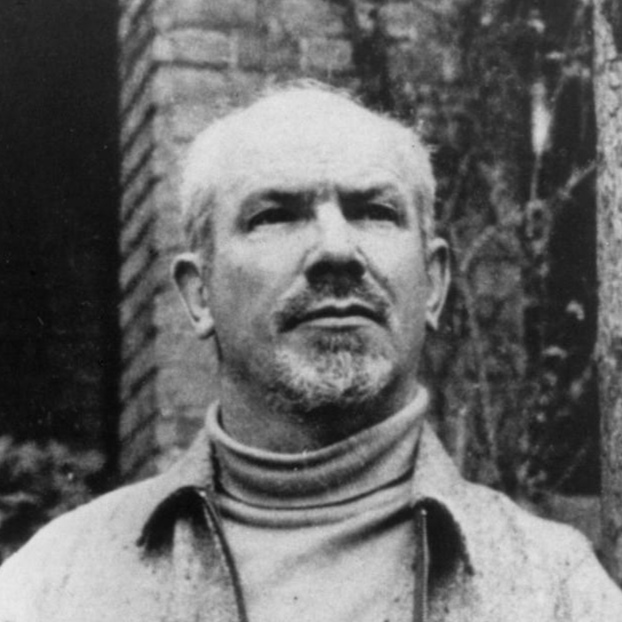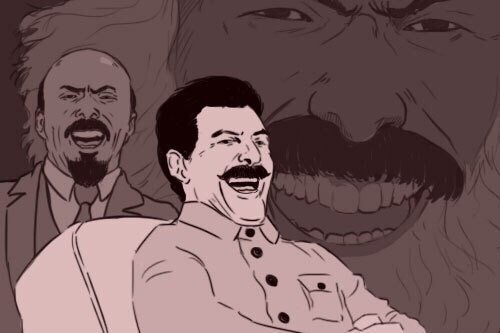- cross-posted to:
- memes@lemmy.ml
- cross-posted to:
- memes@lemmy.ml
※This anecdote is retold in a way that prioritizes the flow and emotions of the event, along with the gist of the event as it actually occurred.
I remember, and I think it was actually earlier this year on R*ddit before the whole migration thing happened, that I was basically accusing someone of being a "Stalinist", right? And that person replied that Stalinism wasn't really a thing — that Stalin's development of socialist theory wasn't really substantial enough to be considered as its own sort of movement or ideology or whatever.
Reading that, I felt a sinking feeling in my chest at the slow realization that my definition of "Stalinism" the whole time I'd been using that word, had really just amounted to, "thinking Stalin was overall a neutral-to-good leader"... Which I think we can all understand isn't an even remotely concrete or useful definition of that word. That's just like, a politician's popularity in an opinion poll.
So I took a deep breath, placed my dainty little lady-fingers back on my laptop keyboard, and replied something like, "Alright, [grumbles], pssshure, I'll concede that point and now feel a bit silly... But... But it's still really terrible that you're praising a figure like Stalin, considering that he was such a monstrous absolute dictator and--"
--My interlocutor then simply showed me the declassified document "Comments on the Change in Soviet Leadership", which is hosted right on the CIA's own official website. This document reads, "Even in Stalin's time there was collective leadership. The Western idea of a dictator within the Communist setup is exaggerated. Misunderstandings on that subject are caused by lack of comprehension of the real nature and organization of the Communist power structure. Stalin, although holding wide powers, was merely the captain of a team and it seems obvious that Khrushchev will be the new captain."
Reading this, I can only imagine that I went red like the Soviet flag with embarrassment at the apparent scope of my own ignorance, while also laughing maniacally at the actual comedy gold that is the existence of a real declassified CIA document which straight-up just says "Stalin wasn't a dictator and you're talking out of your ass if you insist the contrary".
My interlocutor continued, "And I know you were going to make a Holodomor argument next."
I faintly mumbled with a sigh, "Am I really that predictable?"
The interlocutor proceeded to demonstrate quite succinctly how many genuinely trustworthy sources dispute the claim that the Ukrainian famine actually was a genocide. These sources weren't enough for me to reject the genocide claim entirely, but were enough to completely disprove my impression that there was any sort of scholarly consensus on the famine being genocide.
I bit my lip. "Well, even if it wasn't deliberate...", I said, "There always is enough food for everyone, and so all famine is a man-made disaster one way or another, caused by inadequate distribution of resources. So it was a failing of the Soviet system in any case."
My interlocutor didn't dispute what I'd written, and didn't present any further points. Which means that I got the last word, and it seemed like my interlocutor had conceded that point to me, which for a competitive and prideful soul like mine should've aroused some feeling of "Hooray! I won!", and yet... I just felt a bit silly. As if someone taller than me had just ruffled my hair and smiled, "Good job, kid;" or as if I were a lion cub play-fighting with its parent, who falls over at the slightest touch just to let me feel like my mews are actually mighty roars.
And this feeling was as addicting as it was unfamiliar and exciting. Like a sudden gay kiss on the cheek from one's love interest, before xe disappears into a rain of myriad cherry blossoms.
It was in that moment that I realized two things:
Firstly, "the tankies" were in fact not all brainwashed imbeciles like I had previously been so thoroughly convinced. This was admittedly a realization I was already beginning to infer for other reasons.
Secondly, I enjoy being humiliated. Like, weirdly enjoy it. Saying asinine bullshit online and getting not only debunked but publicly revealed to be the "listens to video essays while playing Half-Life: Blue Shift" type of know-nothing pseudo-leftist feels so goddamn fucking good, I swear to all the deities worshipped on this fair Planet Earth.
Comrades, please. You have to dunk on me.
In taking my first steps into learning more about Stalin, this was both funny and informative. As for the dunking, I'll have to crawl out of the 'pseudo-leftist' pit first before dunking others. o7
Hey comrade, thanks a lot for the story and the links! I know that this is not the main point of your story, but can you please elaborate more about this?
I bit my lip. "Well, even if it wasn't deliberate...", I said, "There always is enough food for everyone, and so all famine is a man-made disaster one way or another, caused by inadequate distribution of resources. So it was a failing of the Soviet system in any case."
I'm afraid you've blindsided me here. I can't really say much other than that the idea that famine in the modern age is necessarily caused by an ample food supply not getting to hungry mouths, was something that I read somewhere I don't remember, and still see repeated in various places now. Just look up the phrase "famine is a man-made disaster" and you'll get a number of results about this idea, describing any number of historical or contemporary famines using more or less that exact phrasing. The idea is essentially that famines tend to have environmental/natural factors as catalysts, such as failed crops, but that food itself is not a scarce resource.
This doesn't necessarily mean that any time someone goes hungry, that it was a deliberate act of an Eeeeevil Regime; but what this does mean is that I ultimately still feel like a more sort of decentralized or horizontal system should be able to better distribute food when a socialist project is still establishing itself and reorganizing or rebuilding its agriculture, right? As a certified know-nothing, though, I can't really give any sort of coherent analysis on what specifically failed with the Soviet system, other than that it was Something and future socialist projects should Learn From It. I hear all these big words like "collectivization" and "mechanization" thrown around, but I just can't really trust myself to really understand all the factors that were at play.
Though I believe that after their more notable famines in the Early Days™, the USSR and the PRC got pretty good at food security. So I guess that that learning from historical tragedies has already happened, on top of the factors relevant to the Early Days™ just no longer being relevant now.
I also know that a large portion of the famine in the DPRK was a result of outside sanctions, though I honestly can't speak for how sanctions might've impacted famines in the early USSR.
a more sort of decentralized or horizontal system should be able to better distribute food when a socialist project is still establishing itself and reorganizing or rebuilding its agriculture, right?
That's definitely not a takeaway from the famine of '32-'33. It took months for a powerful central government to sort through the conflicting reports from local officials, get an accurate picture and mount an alleviation. I don't think it's possible that decentralised system would've grasped the extent or even the fact of a famine in a more timely manner.
Alright, "if you say so" is probably a bit dismissive of me. What I mean to say is that my impression is that decentralized systems are more flexible, but there's probably some very obvious fact refuting this WRT the '30s famine, which is right behind me, isn't it?
No obvious fact I'm afraid. It's only meagre analysis. If some disaster befell random oblasts scattered across the Union it may be true that a decentralised system could deal with it better. I wouldn;t make that argument but I'm willing to hear one out. Famine-causing disasters on the other hand, namely floods and drought, occur in lumps, in this case a large swathe from Belarus to Kazakhstan.
Reading the correspondences in this matter, there seems to be nothing but confusion. Collective farms asking for seed, CPU members vaguely hinting at low sowing without ever explicitly saying there's a famine to be alleviated and leadership of the Ukrainian SSR bemoaning the grain procurement demands of the CC of CPSU while working to over-export as late as December 1932. Kaganovich was sent to the Ukraine to sort out what was going on and it took him months to realise they were facing a famine and officials in Belarus were questioning the state of affairs since historically Ukraine had fed Belarus and not the other way around. I don't really see any sort of decentralised system, be it at a soviet or oblast level, figuring out the situation to a significant degree, finding who might spare the grain and establishing the connection to get that grain over many hundreds of kilometres. I'll hear out if you've got any ideas, but I just don't find it realistic.
So you mentioned thinking about “the tankies”. Is that like a brand-new term when it comes to its usage? I know it’s older than that but it still seems like just a few years ago we almost never heard that term (at least I hadent)
I've had this handle for many years now, including on
 . It was always around as a term but you really had to be politics brained to understand it.
. It was always around as a term but you really had to be politics brained to understand it.Recently it became shorthand for "person on the left I don't like".
Well, /r/shittankiessay has existed since at least 2016, maybe earlier? I feel like the rise of the word "tankie" in mainstream political discourse really started around that point, and is reaching its peak of popularity in this decade.
Ah, I see. I’m thinking in like 2018 I don’t recall ever hearing the term and didn’t learn what it meant until like 2021
Aw, this is sweet and it really captures a part of "radicalization" that often gets overlooked in favor of discussing more serious and longterm factors: the feeling of being a liberal and having your worldview dismantled -not just smugly sneered at, but actually unwoven thread by thread in a way that makes you realize the breathtaking scope of the world and your ignorance of it. To be alternately educated and dunked on with such pinpoint precisione that you simply can't go back to being the same person as before and you're not even mad about it.
A YouTube link was detected in your comment. Here are links to the same video on Invidious, which is a YouTube frontend that protects your privacy:
The only dunk I have really is: if you are willing to interact with tankies and listen in good faith, it's as good as over. It's only a matter of time. You might as well get your hammer/sickle merch and sign up for direct deposit Xibucks already.
Half-jokes aside, so much of life made so much more sense when I started my own coy, tsundere journey towards MLism, particularly global history and current events. We are not infallible as individuals, of course not, we're just as full of jackasses as any other ideology, but the ideology and the narrative that it presents is more complete than anything else I gave a chance.
Your story was relatable, it feels good to get schooled sometimes (respectfully), it feels good to have the ice bucket dumped on you sometimes. Blessed day.
Did you happen to self-label as an anarchist before, by any chance?
Yes, there was a period of time as I started getting into politics that I identified as an anarcho-communist. I eventually became a big advocate for Left Unity and started to call myself a "non denominational socialist."
However, then the word "tankie" entered the scene and though I started to admire things like the USSR and their victories for the common people, I made sure to draw a clear line and distance myself from people like Stalin or modern day China.
And now here I am today! Unabashed!
I still believe that the majority of anarchists ultimately crave the same world that MLs do. We all want a world of peace and plenty and justice. It's just a matter of, "How do we get there?", is when things split.
Stalin doesn't scare neolibs at all. He was dead before they attained power and their view towards him is an acceptance of the casual liberal cold war narrative: a brutal dictator that "did X to his own people" (a useful narrative to excuse why your Wholesome American Troops mowing down hundreds of thousands of civilians in Asia and murdering communists worldwide).
Neoliberals are afraid of contradiction and losing power. They're more afraid of Putin than Stalin, despite Putin being a fellow liberal. They're more afraid of even MAS in Bolivia, as it shows that opposition can be created and maintained.
Wait Putin is actually liberal? Or neoliberal? Or liberal how the USA thinks?
Liberal as in a supporter of the ideology of capitalism. Capitalism is hegemonic, so this includes both conservatives and so-called progressives so long as they support capitalism. This is the common use of the term outside of the US and historically, where it is contrasted with the left, like socialists and anarchists.
Putin is presumably a bit neoliberal as well, or at least the power structures he's involved in do, as Russia's monetary policy is currently neoliberal despite the fact that sanctions have forced the country to take on anti-neoliberal capital investment and planning policies.
Ah ok thanks. The American type Democrat party pink-washing type of "librul". Well I've seen weirder










